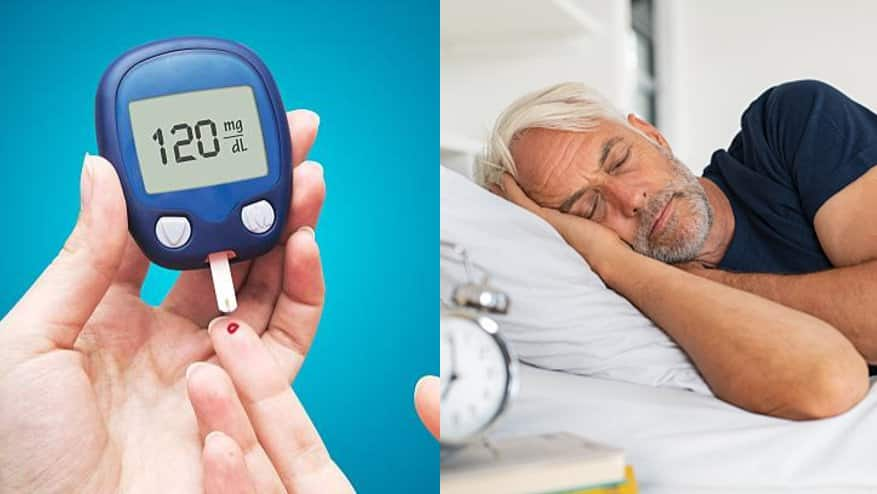Diabetes control: Sleep disruptions, such as sleeping problems and diagnosed sleep disorders, are widespread in contemporary culture. The most frequent sleep disorder is probably insufficient sleep, or not staying in bed long enough. According to reports, the majority of sleep issues are linked to insulin resistance, prediabetes, and diabetes and significantly affect glucose tolerance.
While nutrition and exercise are frequently discussed in the context of managing diabetes, little is discussed about sleep. Particularly among Indians living in cities, sleep disturbances are common.
Impact of lack of sleep on blood sugar levels
An inclination towards glucose intolerance is aided by frequent nighttime awakenings, inadequate sleep, excessive sleep, and irregular sleep. In addition, having prediabetes or diabetes will make it worse if a person has poor sleep habits.
Sleep deprivation has been linked to insulin resistance and an increased risk of pre-diabetes and diabetes, according to research findings. Individuals with diabetes who lacked sleep have worse control over their diabetes. Lack of sleep reduces leptin, a hormone that indicates contentment and increases ghrelin, a hormone that makes you feel more hungry than usual. As a result, people eat more, put on weight, and their blood sugar levels rise. Also, staying up late encourages nighttime snacking.
Impact of diabetes on sleep
Continuous sleep loss may cause insulin resistance, which can cause diabetes and high blood sugar levels. Chronic sleep deprivation has been linked in some studies to changes in hormones that regulate hunger. Diabetes and lack of sleep combined can cause a series of issues and conditions:
Restless legs syndrome
Restless leg syndrome is an under-recognized condition that causes an uncontrollable impulse to move the legs in response to an uncomfortable sensation in the legs. While daytime symptoms are possible, most sufferers of this disease have trouble falling asleep. Even though it cannot be cured, medicine can be used to manage it.
Excessive urination
Elevated blood sugar levels cause a steady increase in urine production, which frequently causes excessive urination during the night. Furthermore, uncontrolled diabetes can have an impact on the autonomic nerve system, affecting regular bowel and bladder functions as well as contributing to nighttime urine incontinence.
Hypoglycemia
Sweating, discomfort, anxiety, and palpitations are all signs of hypoglycemia. You may get insomnia if your blood sugar is low. Attacks of low blood sugar (hypoglycemia) can occur at night for people who skip meals after taking insulin or certain diabetic medications (sulfonylureas), have diarrhoea, vomit, or any other condition that decreases food intake.
Peripheral Neuropathy
A “glove and stocking” neuropathy, which causes discomfort, tingling, and numbness in the hands and feet, is another negative impact of diabetes. Individuals who suffer from this condition may have trouble falling and staying asleep.
How can I improve my sleep?
In addition to medications, recommendations to improve sleep are:
– Discover ways to unwind and breathe.
– Listen to relaxing or nature music.
– Do regular exercise, no later than a few hours before going to bed.
– Avoid consuming alcohol, nicotine, or caffeine in the evening.
– Prevent or cut down on afternoon napping.
– When you can’t sleep, get out of bed and do something in another room. If you begin to feel sleepy, return to bed.
– Only use the bed for sleeping and having sexual relations. Don’t read or watch TV when lying in bed. Your bed will then serve as a cue for sleeping rather than for staying awake.
– Consider engaging in cognitive behavioural therapy (CBT), a reliable first-line treatment for insomnia.
– Spend at least 30 minutes without using any screens before night, including TV, computers, and mobile devices.
– Keeping the room at a suitable temperature while you sleep with the lights off.
Identifying any medical problem that might be interfering with sleep is a crucial part of high blood sugar management.
(Disclaimer: This article is based on general information and does not substitute fo ran expert’s advice. Zee News does not confirm this.)







More News
Mental Health And Motherhood: Know How To Balance Parenting As Well As Self-Care
International Nurses Day 2024: 5 challenges faced by nurses; tips to overcome them
Mothers Day 2024: How Low Protein Intake Affects Energy Levels In Moms